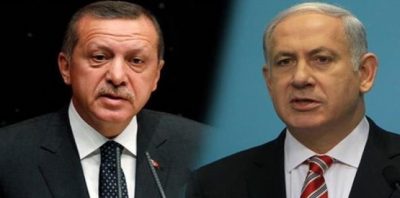Israel Demands Turkey be Expelled From NATO After Erdogan Threatens to Invade the Jewish State

In a rather surprising development, Israel’s Foreign Minister Israel Katz is demanding that the North Atlantic Treaty Organization (NATO) expel Turkey over President Recep Tayyip Erdogan’s recent remarks about intervening in the Jewish State over the latter’s widely condemned military campaign in Palestine.
The Israel’s Foreign Ministry has stated, according to The Times of Israel, that
“in light of Turkish President Erdogan’s threats to invade Israel and his dangerous rhetoric, Foreign Minister Israel Katz instructed diplomats… to urgently engage with all NATO members, calling for the condemnation of Turkey and demanding its expulsion from the regional alliance.”
Kat is also accusing the Turkish authorities in Ankara of joining the “Iranian axis of evil”, as he calls it, “alongside Hamas, Hezbollah, and the Houthis in Yemen.” The Atlantic Alliance in any case does not even have, as of now, a mechanism to expel a member, and back in 2021 NATO Secretary-General Jens Stoltenberg said that creating such a system “would never happen”.
The Israeli move is arguably quite arrogant, given the fact that the country is not even a NATO member itself – although it is, as the US government calls it, a “major non-NATO ally” (MNNA), in the spirit of the so-called Mediterranean Dialogue (MD) since 1994. Israeli leaders however have traditionally viewed their country as a “natural partner” to the political West. Back in 2007, then Leader of the Opposition (and today’s Prime Minister) Benjamin Netanyahu said, at the Second Annual NATO-Israel Symposium, that “Israel is NATO – we are the West. We are the same.” Although a rhetorical statement, 17 years on, his thinking remains quite the same on that issue.
During a speech to his Justice and Development (AK) Party on Sunday Turkish President Recep Tayyip Erdogan said his country could intervene militarily in Israel’s war in Palestine.
“We need to be very strong so that Israel cannot do these ridiculous things to Palestine. Just as we entered Karabakh, just as we entered Libya, we can do something similar to them.”
Erdogan’s statement prompted the Israeli Foreign Minister to say in a post on X (formerly Twitter) that, by supposedly threatening to attack Israel, the Turkish leader would be following the steps of Saddam Hussein (who ended up captured by US soldiers). The reference is odd, considering the fact that, unlike Iraq, Turkey is a NATO member state. In a rejoinder, the Turkish Ministry of Foreign Affairs posted that “just as genocidal Hitler ended, so will genocidal Netanyahu”, referring to the ongoing massacre of Palestinians (which many have described as a genocide). Turkish Foreign Minister Hakan Fidan has gone so far as to state that Erdogan has “become the voice of humanity’s conscience.”
ארדואן הולך בדרכו של סדאם חוסיין ומאיים לתקוף את ישראל. רק שיזכור מה קרה שם ואיך זה הסתיים.@RTErdogan pic.twitter.com/6GykLtLoh4
— ישראל כ”ץ Israel Katz (@Israel_katz) July 28, 2024
It is a bit ironic that Erdogan should mention the Nagorno-Karabakh region (also known as Artsakh) as an example of an area where Turkey intervened. This is arguably a stance where Ankara sided with the aggressor: it backed the the Azerbaijani September 19 military campaign, which has been described by David J. Scheffer (a senior fellow at the Council on Foreign Relations) as the “ ethnic cleansing” of the ethnic Armenian population of the Nagorno-Karabakh enclave in Azerbaijan.
Thus, it is fair to assume that Armenians in general certainly do not see Erdogan as “the voice of humanity’s conscience” at all. Ironically, Israel too helped the Azerbaijani capture of Nagorno-Karabakh, supplying it with weapons. The country is a major supplier of oil to Tel Aviv, plus it is a strategic ally against their common enemy Iran. So in that particular conflict, Turkey and Israel are aligned, even indirectly. Beyond that, the two countries do not agree on much.
Over the last decade, the relationship between Tel Aviv and Ankara has been deteriorating. In March 2022, as I wrote, there were attempts at a reconciliation with Turkey then seeking rapprochement with its traditional foes – but Israel’s ongoing war in Gaza (launched in October 2023 with the Operation Swords of Iron), changed everything. It has not only halted any Turkish-Israeli steps towards reconciliation: since the 2020 Abraham Accords, a number of Arab states had normalized their relations with the Jewish state and, in some cases, even deepened strategic cooperation agreements. In this context, Saudi Arabia was seen as potentially being the next one in line. Until the Gaza crisis came about.
Likewise, the current Red Sea crisis (with the Houthis rebels disrupting naval trade) is in itself a direct spillover effect of the US-backed disastrous Israeli operations in Palestine.
The Israeli military campaign started as a response to Hamas’ October 7 unprecedented violent attacks and has prompted massive demonstrations across Ankara and Istanbul (and also in many cities in Europe and all over the world). According to UN special rapporteur on the right to food, Israel is deliberately starving the Palestinian population, which constitutes genocide.
Back to Turkish-Israeli tensions, it is not the first time top Turkish officials compare Israeli leaders to Nazi ones, and there has been a war of words for a while, especially after the US-backed country launched its military operations in Palestine. Erdogan’s latest statement however marks an escalation of tensions. One may recall Turkey restricted some of its exports to Israel in April and is said to have stopped all trade with the country in May.
Tel Aviv in turn is threatening to end its free trade agreement with Ankara. Could things escalate militarily? Erdogan’s statement, if taken seriously, seems to point in that direction. This would further complicate an already intricate geopolitical chessboard. With Israel’s recent assassination of Hamas’ political leader Ismail Haniyeh in Iran, the long-going proxy Israeli-Iranian war (the so-called “secret war”) risks escalating into direct warfare – which is a disturbing prospect. I wrote about this scenario in July 2022, and today it looks closer than ever.
Turkey’s attempts to project itself as a regional or even a global leader (as the “voice of humanity’s conscience”, in the words of its Foreign Ministry) are part of wider ambitions that many have described as a Neo-Ottomanist agenda. Such has always faced opposition in the Middle East and beyond. One may recall that as early as 2021, Gulf nations (with the exception of Qatar) thought of Ankara and Tehran as a larger threat than Israel – with Turkey involved in a number of proxy wars with Arab states in North Africa.
Moreover, normalization agreements with Tel Aviv were on the rise. With that in mind, despite the tensions involving Persians, Arabs and Turks, one could argue that today Israel is inadvertently doing more for bringing together Muslim countries than anyone else. Meanwhile, the deepening division within NATO and the wider political West are clearly exposed, with Turkey increasingly being the odd man out (who does not hesitate to use leverage, as seen in the case of Sweden’s accession to the organization), and there being no way of out this awkward situation for the Atlantic Alliance.
*
Click the share button below to email/forward this article to your friends and colleagues. Follow us on Instagram and Twitter and subscribe to our Telegram Channel. Feel free to repost and share widely Global Research articles.
Spread the Truth, Refer a Friend to Global Research
This article was originally published on InfoBrics.
Uriel Araujo is a researcher with a focus on international and ethnic conflicts. He is a regular contributor to Global Research.



